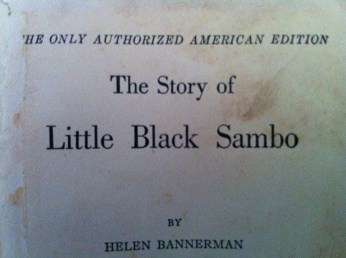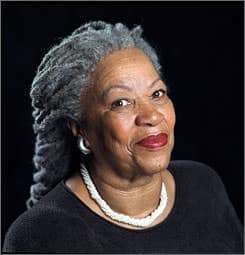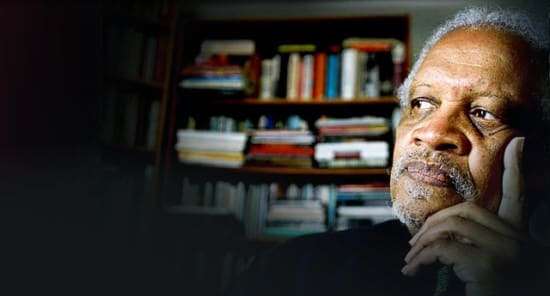If you pay attention, you’ll notice how often we Americans mimic a version of Black dialect and persona. We shift our speech and demeanor, usually only momentarily and often with the intent to create momentary comic relief. These fleeting moments of burlesque evoke a stylized version of how Black people are thought to express themselves, or how they might do so in mythical worlds like “Dear Ole Dixie” or “The Ghetto.”
I am not referring to anything like malicious ridicule meant to wound, offend, and provoke Black people. These are an almost-unconscious series of informal expressive gestures that most Americans can be expected to employ at one time or another without giving much thought to what they are doing. And they’re delivered with an air that assures that this pseudo-Black verbal style is not to be taken seriously by anyone. Over the last two decades, however, African-American writers have treated every version of Black vernacular language, gesture, and the folklore that embodies it, as a starting point for reinvention of the African-American nation and personality. We use this material, which for many others is the stuff of off-handed humor and sitcoms, to do some serious metaphysical work. As T.S. Eliot’s famous lines from “Four Quartets, Little Gidding” go:
Since our concern was speech, and speech impelled us
To purify the dialect of the tribe
And urge the mind to aftersight and foresight
Every use of Black vernacular language or folkways in fiction reopens a discussion about race, both within Black America and with the nation as a whole. Working with vernacular material that evokes racial difference and feelings about race is not easy or safe work. If the writing is significant, there is likely to be blowback in which you will be labeled a bigot, reverse racist, or an old-fashioned trouble maker. It you take the safe approach to race in fiction, it will be boring and preachy, and you might as well have written a race-relations textbook or offered a diversity class.
We Americans live in a world that is racially charged, with some taboo lines that are sharp, and others that are mind-bogglingly fuzzy. Because self-esteem and ethnic pride are at risk, the topic is protected by conventions of politeness, utter vacancy of thought, euphemisms, and denials, and as a result, an insightful and moderately considerate human being who writes or speaks authentically about race risks feeling they have transgressed these conventions, committed some sin of public discourse.
Two situations in which I felt I was transgressing racial taboos in writing stand out for me. As with other sins of the flesh (for race is of the flesh isn’t it?), I committed my first sin of this kind as a college student with a mutually consenting friend. We composed a poem that became a kind of oral tradition within a very small circle. The poem featured that once ubiquitous bane of Black grammar schoolers, Pancakivore, Pancakasaurus, aka “Little Black Sambo,” that umbrella carrying, Jovial Reaper who strikes down Black kids with the scythe of unbearable embarrassment.
My friend and I were undergraduates, not kids, when we were inspired to rewrite the story in verse as a mocking protest of Sambo’s Restaurant, then part of a large national chain. Sambo’s occupied a prominent place on Main Street and prevented any chance of boycott by serving to one and all, without discrimination, the best pancakes found in our small Midwestern college town. The hero of our revision of this race-classic was not Little Black Sambo, but Sambo the Kid, an IV drug user and dealer. The Tigers in the story were kind of like Bob Bennett’s morality cops, but they spoke Black vernacular dialect as they collared The Kid without reading him his Miranda rights.
To get the flavor of our poem, here a few lines in which the abusive Tigers illegally interrogate the Kid:
Dem Tigers said
“You jiving, jokin, junked-up foo!
What you doin in duh jungle and not in schoo?
You best start talk’n and talk’n fast
And if yo’ talk ain’t sweet, we gon kick your ass.”
Writing verse or dialogue in dialect is a dialectical process. You weigh the balance of the glory and the inanity of the language of your tribe and often end up perplexed. But you write the damned lines anyway, as the Scot poet who took up the burden for his tribe, ole Rabbie Burns, would tell ye, if he ware nae deid. To “do” dialect writing you have to twist Standard American Prime Time [TV] English (SAPTE) all over the place, without a speller, rhyming dictionary, or a suitable beverage or psychoactive drug to assist you in the task. In addition to regional and individual differences, Black vernacular is highly self-reflective and self-conscious. Even a street brother chosen at random—such a man anthropologists might classify as a naive adult informant—is likely to be flipping up or flipping-out syntax while initiating the equivalent to the Great Vowel Shift that obliterated Chaucerian English. And that brother would be saying “We called it the Slide, back in the day!”
My second experience of writing over the racial taboo line came during the composition of a humorous and deadly serious short story titled “Blue in Brazil.” The story follows an elderly, uneducated man who is nicknamed Blue because “he so black he blue.” Blue dramatically delivers his tale in a poetic, exaggerated Black vernacular. Through a narrator, who is fluent only in SAPTE, Blue tells of his unlikely adventures in Brazil, with lots of theatrics over highfalutin existential motifs like sex, violence and death.
Why did I feel that in co-creating “Sambo the Kid” and writing “Blue in Brazil,” I was breaking some transracial taboo? Neither piece of writing involves a significant interaction of characters of different races. But for Americans, the racial tension is an element of the cultural envelope in which writing is done. Toni Morrison expounded on the character of this enveloping presence of race in her collection of essays, Playing in the Dark: Whiteness and the Literary Imagination (1992). She pointed out the irony—although not in exactly these words—that Uncle Tom’s Cabin was not written for Uncle Tom to read and review. It was written for affluent Northern White women who were the major consumers of tearjerkers. Similarly, Mark Twain did not aim for Huckleberry Finn to move Jim’s heartstrings so the man would come to his goddamn senses and stop slaving himself.
Morrison was asserting that the entire cannon of American literature and much of American iconography, relies on what she has named American Africanism. Morrison’s American Africanism refers to two ubiquitous aspects of almost all American fiction. The first aspect is that the reader of American fiction (and almost all writing in America) is always positioned in race, that is, it carries with it the assumption that the reader is White, as is the author, unless the author explicitly self-identifies in the text as nonwhite. The second aspect of American Africanism is the use of a master trope in which direct or indirect references to African people, black and dark things, and by association, dirt, and death, are used to justify and extend the positive value of whiteness. That the American Africanism trope is pervasive and part of the deep structure of our culture is evidenced by the iconography of Mickey and Minnie. These characters are virtually invisible to us as the minstrels they were meant to be: white-people mice in blackface and white gloves.
Mickey and Minnie played the roles of Uncle Tom and Little Eva in a musical version of Uncle Tom’s Cabin, in a cartoon created five years after Mickey’s debut as Steamboat Willie.
From the understanding of American Africanism, the black stone that was rejected by the builders has become the cornerstone of America’s literary temple, just as Black music has become the sound track of White lives. And Black authors are not exempt from American Africanism, although, of course, like writers of any background they can parody this trope or turn it back on itself, as did Herman Melville in Moby Dick, or any of the novels of Ishmael Reed.
The concept of American Africanism has the specific implication that each text of fiction created by Black authors should be interrogated as to whether it was written with any Black readers in mind at all, and for how that text deals with American Africanism. The broadest implication of American Africanism is that a transracial lens is needed if we are to understand or write American fiction. This is something that cannot be said truthfully about, for instance, British or French literature.
My experience of transracial guilt arose from the acute awareness that Sambo and Blue and the vernacular I put in their mouths would scratch at old wounds. It was as if racial perceptions and expectations were dueling for control over my keyboard, like the cartoon angel and devil over old Sylvester the Cat’s shoulders. On one shoulder is my White avatar whose gaze whitewashes the surface of things and seals off their interiors, while whispering we live in the post-racial era. On the other shoulder is my African-American avatar, who is holding up the cross of MLK Jr. to ward off stereotypes like Blue and Sambo, and to banish my printed dialect to the Pit of Hellfire, whispering that there’s no sense in conjuring up bad vibes from the past.
Writing with a transracial lens, as I am describing it, demands an almost superhuman awareness of one’s identifications, projections, grudges, etc., plus at least a trifling basis for claiming to be well-read in at least a few forms of English language literature in addition to Black Literature. Philosophers have had much to say about the need for self-knowledge and the limit of what knowledge we can attain. Psychology seems to want to take over this kind of advice. But it’s the writers who step out and speak that self-knowing in a new tongue that can potentially become part of a shared American language.








